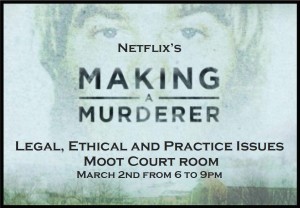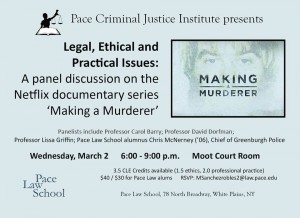Student Perspective: Making A Murderer Event
POST WRITTEN BY: Danielle Petretta (’17), J.D. Pace Law School
On March 2, 2016, Pace Law School’s Criminal Justice Society, Student Bar Association, and the Criminal Justice Institute held an event on the controversial and popular Netflix 10-episode documentary, “Making a Murderer.” The documentary centers on a man named Steven Avery, who found himself stuck deep in the trenches of our criminal justice legal system within a very small knit rural community in Wisconsin.
Steven Avery spent 18 years in prison for a crime he did not commit and in 2003 was finally exonerated. This case received much attention including an effort to pass a bill – the Avery Bill – implementing checks and balances regarding police interrogations, handling and testing of DNA evidence, and policies surrounding an eye witness identification procedures to prevent wrongful convictions. However, his nightmares continued, as just two years later he was arrested for the murder of 25-year-old photographer Teresa Halbach. Steven Avery’s nephew, Brenden Dassey, was also arrested for partaking in the Halbach murder. Both Steven Avery and Brenden Dassey remain in prison to date and Steven Avery continues to claim his innocence this time around as well. It is yet to be determined what the status of their appeal is, and the documentary leaves gaping concerns and questions to be answered. The documentary maps Steven Avery’s unfortunate journey through the legal system to date and takes the viewer on a shocking ride.
Did the fact that the Avery’s lived in Manitowoc County, a small knit community, affect the way in which they were treated? Did the appearances and social status of the Avery and Dassey families play an influential role in their prosecutions? Why was the police department involved in the first case able to have a continued presence and involvement in the subsequent Halbach case? Was the evidence tampered with? Were proper police procedures followed? Did someone tipped off the woman who found Teresa Halback’s car in the Avery’s 4,000 car lot within just a few minutes? Why was the same judge deciding Avery’s motion for a new trial when he had been the presiding judge in his trial? What happened in the jury room? Why was the key, one main piece of evidence against Avery, found days after the seventh search?
The discussion panel held at this fabulous event consisted of professors, former prosecutors, and the Greenburg Chief of Police. Professors of professional responsibility, criminal procedure and criminal practice provided valuable feedback responding to many of the questions continuously discussed. After the initial introduction of the topic by the panelists, the room flooded with questions and comments about the documentary, what it portrayed as well as what it didn’t establish. Discussions and comments about the police work sparked much attention among the crowd of students and current attorneys, and critiques and opinion regarding the prosecution and defense lawyers’ conduct triggered a heated response from the audience.
This discussion panel coupled with the audience forum offered an amazing opportunity for students, attorneys, professors, and community members to debate and challenge the current criminal justice legal system that is so embedded within our society.
Related Readings:
- Lissa Griffin, Making a Murderer: A Broader Debate, Pace Criminal Justice Blog (Jan. 29, 2016).
- Netflix – Making a Murder
- Steven Avery Innocence Project Profile
- Yoni Heisler, Making a Murderer, BGR (Jan. 14, 2016).
- Jack Murtha, The Media’s Complicated Role in Making a Murderer, Columbia Journalism Review (Jan. 7, 2016).
- Mike McPhate, Record Number of False Convictions Overturned in 2015, New York Times (Feb. 3, 2016).
- How ‘Making a Murderer’ Exposes Flaws in Juvenile Justice System, MPR News (Feb. 1, 2016).
- Wisconsin Law Journal Staff, Avery Bill Finds Legislative Support, Wisconsin Law Journal (Aug. 31, 2005).
- Steven Avery Trial Transcripts and Documents


